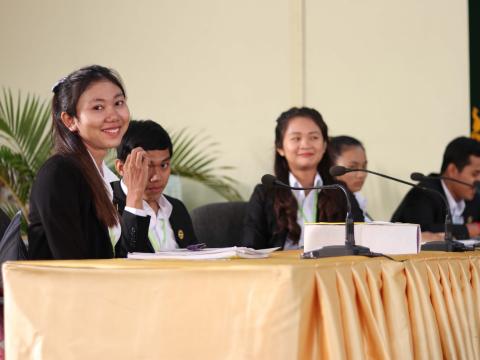Street Beggars

On June 12th and 13th of 2017, Cambodian youth were able to participate in a debate over "building public awareness of street beggars" at a national television station (TVK). Over 40 students from eight universities attended the debate with over 150 audience members.
The debate’s aim was to mobilize youth participation in advocacy activities and raise their awareness of the negative impacts of giving money to street beggars. In addition, it encouraged youth to have more initiative in coming up with innovative concepts to improve the current preventive actions taken on the beggars, and create a space for the youth’s ideas to be put into implementation. This will equip youth with the skills to be advocates, building their confidence and awareness of their citizenship.
Through this, the public’s perceptions and behaviour towards the girls and boys and their families who live on the street will change, transforming their actions and serving the children.
During the debate, the youth voiced their ideas regarding the pros and cons of giving money to children either working on the street or begging money. Furthermore, they were able to get suggestions to solve the issue of people living and working on the streets. The debate was begun by giving seven questions to the eight debate groups. Throughout the debate, the youths’ ideas, experiences, observations and lessons learned were articulated.
Mr. Pharen San, Senior Project Manager of World Vision’s Street Children Transformation Project says, “we (organisers) expected that through the forum, students would be able to actively send a message to the public about the advantages and disadvantages of giving money directly to beggars on the street. Through this, the public’s perceptions and behaviour towards the girls and boys and their families who live on the street will change, transforming their actions and serving the children.
In the next week, there will be a reflective meeting with the students who had participated in the debate, encouraging them to partake in more activities that will serve the community.
The public should think more about the consequences of giving money to beggars on the streets. The children lose their right to go to school.
“I hope they (the students) will participate in service-oriented activities as a result of their participation with Social Affairs Veterans and Youth Rehabilitation (MoSVY) and Word Vision. They have the ability to make a difference, even by simple acts such as creating charity boxes in their universities that will go towards supporting any street children who wish to get vocational skills, become educated, apply for small business grants and access health care,” adds Pharen. “Giving donations in places like traffic lights, or busy public streets can put street children at risk of accidents. Your donation may also not benefit the children directly.”
The group of students from the University of Cambodia raised the point that giving money to the children working on the street encourages child labour exploitation and encourages families to earn money through begging. They cited the example of many babies being used by adults in order to gain compassion from travelers. The public should think more about the consequences of giving money to beggars on the streets. The children lose their right to go to school.
This debate was created as part of World Vision’s Street Children Transformation project activities. The project aims to transform the lives of the at-risk and engages street children. It directly benefits over 2,600 children and indirectly reaches out to 12,000 children. This is the first time in Cambodia that the street beggar issue has been publicly debated, or even raised. This debate was initiated by World Vision International in Cambodia. With cooperation with Ministry of Social Affairs Veterans and Youth Rehabilitation (MoSVY), Ministry of Information (MOI) and fully funded by World Vision and Friends International, the debate was orgnized with technical support from his excellency, and her excellency from MoSVY, Ministry of Information, Ministry of Religions, and Cults, Ministry of Education Youth and Sport and Phnom Penh Municipal.

